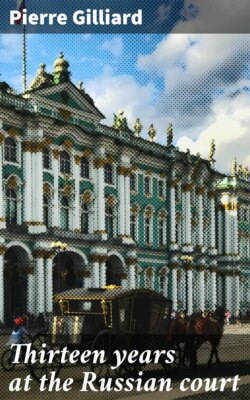Читать книгу Thirteen years at the Russian court - Pierre Gilliard - Страница 11
На сайте Литреса книга снята с продажи.
CHAPTER VI
LIFE AT TSARSKOÏE-SELO—MY PUPILS
(THE WINTER OF 1913-14)
ОглавлениеTable of Contents
TO Rasputin was once more attributed the improvement in Alexis Nicolaïevitch’s health a few days after the terrible attack to which I have referred.
It will be remembered that the attack had occurred shortly after that change in the Czarevitch’s manner of life I had thought it my duty to advocate. I thus felt partially responsible.
I was in a very great difficulty. When I decided as I did, I had, of course, realised the great dangers involved and thought myself strong enough to face them. But the test of reality was so dreadful that I had to consider whether I ought to persevere.... And yet I felt strongly that I had no alternative.
After two months’ convalescence—the Czarevitch only recovered slowly—the Czar and Czarina made up their minds to persevere with the method they had adopted, notwithstanding the risks.
Dr. Botkin[12] and Dr. Derevenko were of a contrary opinion, but bowed to the parents’ desires and bravely accepted a decision which added considerably to the difficulties of a task which was exacting and unpromising enough as it was. They were always on the look-out for the possible crisis, and when the accident happened the struggle was all the harder for them because they realised the inadequacy of the remedies at their disposal. When, after nights of watching, they had the joy of seeing their young patient out of dangerous, the improvement was attributed, not to their care and efforts, but to the miraculous intervention of Rasputin! But there was no false pride or envy about them, for they were inspired by feelings of the deepest pity for the tortured mother and father and the sufferings of the child who, at ten years of age, had already had far more to bear than most men in a long lifetime.
Our stay in the Crimea was longer than usual owing to Alexis Nicolaïevitch’s illness, and we only returned to Tsarskoïe-Selo in December. We then spent the whole winter of 1913-14 there.
Our life at Tsarskoïe-Selo was far more intimate than when we were in residence at other palaces. With the exception of the maid-of-honour on duty and the officer commanding the “composite”[13] regiment, the suite did not live in the palace, and unless relations were visiting the family the latter generally took their meals alone very quietly.
Lessons[14] began at nine o’clock, and there was a break from eleven to twelve. We went out driving in a carriage, sledge, or car, and then work was resumed until lunch at one. In the afternoon we always spent two hours out of doors. The Grand-Duchesses and, when he was free, the Czar, came with us, and Alexis Nicolaïevitch played with them, sliding on an ice
